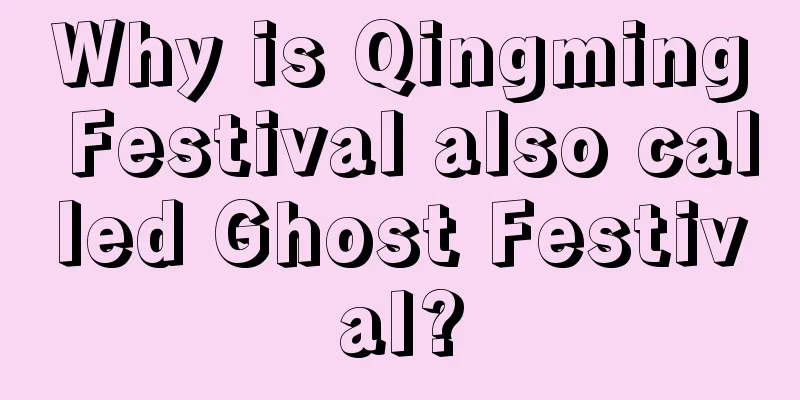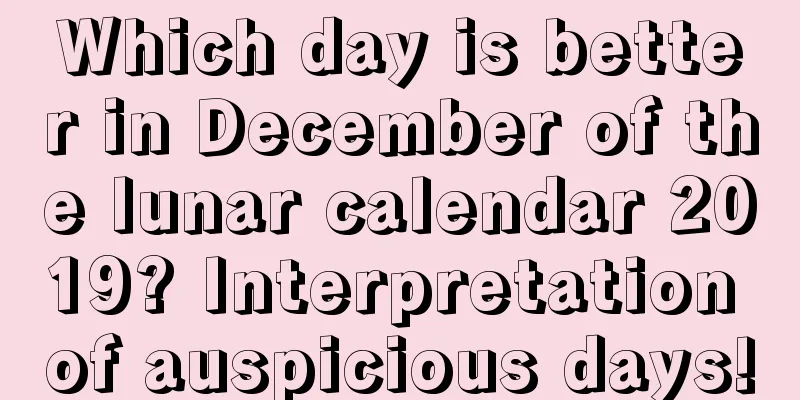Why is Qingming Festival also called Ghost Festival?

Introduction: Ghost Festival, as the name suggests, is a festival celebrated by ghosts. The folk custom has evolved into ordinary people worshiping ghosts and gods. Qingming Festival is one of the four major ghost festivals in China. So why is Qingming Festival also called Ghost Festival? What else do you say? Let’s follow the editor to learn more about it below! March is wonderful because of your encouragement. The seeds sown in March will yield a good harvest in autumn. The drizzle in March nourishes you like milk and brings you the most beautiful start. I wish your March will be as beautiful.What are the four major ghost festivals in China?1. Qingming FestivalFebruary and March 3 3. July 14th/15th (Depending on local customs, some places consider July 14th to be Ghost Festival, while others consider July 15th to be Ghost Festival) Fourth, October 1st Qingming FestivalPeople visit graves on Qingming Festival and also have the custom of going out for an outing, throwing new soil on the graves to add to the soil. In the past, Qingming Festival was also called Cold Food Festival, which lasted for a hundred days. Cao Cao changed it to one day, and the Tang Dynasty changed it to three days before Qingming Festival. All fires had to be extinguished, and new fires would be lit from the palace after the Cold Food Festival. During the Qingming Festival, people also plant willow branches, wear wicker hats, fly kites and swing on the swings.March 3In the Jianghuai and Jiangnan areas, the third day of the third lunar month every year is called Ghost Festival. Legend has it that ghosts appear on this day. At night, every household sets off firecrackers in every house to scare away the ghosts.July 14/15According to legend, starting from July 1st every year, the King of Hell will order the gates of hell to be opened, allowing the wronged souls and evil ghosts who have been suffering in hell for a long time to walk out of hell, enjoy a short period of wandering, and enjoy the blood and food of the world. Therefore, people call July the Ghost Month. This month is considered an unlucky month, and people neither get married nor move.The 14th or 15th day of the seventh lunar month is the Yulan Festival, also known as the Zhongyuan Festival, the Mid-Autumn Festival or the Ghost Festival. In the past, people would not only worship their ancestors on this night, but also prepare some dishes, wine, rice, gold and silver paper and other things to worship ghosts and gods at the intersection. July 14th/15th of the lunar calendar is the biggest festival in the underworld - Ghost Festival, also known as the Zhongyuan Festival or Yulan Festival, which is one of the three important festivals in the underworld in my country. There is a folk legend that the Lantern Festival is celebrated in the world of the living and the Ghost Festival is celebrated in the underworld. It is said that on that day the King of Hell will also dress in his best attire to celebrate the festival with the ghosts, and ask us living people to bless them together, wishing the people in another world all their wishes come true, and happily enjoy the happiness that they didn't have time to enjoy in the human world. Therefore, many places in our country will hold activities such as sacrifice, visiting Buddha, cleaning tombs, looking back, appreciating flowers, fishing, etc. to celebrate. Ghost Festival originated from the story of Mulian saving his mother: "There was a monk named Mulian, who had great magical powers. His mother fell into the realm of hungry ghosts. As soon as food entered her mouth, it turned into flames. She was suffering from extreme hunger. Mulian was unable to save his mother, so he sought help from the Buddha, who preached the Ullambana Sutra and taught him to make a Ullambana on the fifteenth day of the seventh month to save his mother." It is said that after Mulian had experienced untold hardships in the underworld, he saw his dead mother, Liu, and found that she was being tortured by a group of hungry ghosts. Mulian wanted to use a bowl to serve her vegetables and rice, but the vegetables and rice were taken away by the hungry ghosts. Mulian had no choice but to ask the Buddha for help. The Buddha was moved by Mulian’s filial piety and gave him the Ullambana Sutra. Following the instructions, Mulian offered precious fruits and vegetarian food to his mother in a Ullambana basin on the fifteenth day of the seventh lunar month. The starving mother finally got food. In order to commemorate Mulian’s filial piety, Buddhists hold a grand "Yulanpen Festival" every year, which is what we now call the "Ghost Festival". The book says that on this day in ancient times, people would set up a magician's seat and a platform for offering sacrifices to the lonely in front of Jiekou Village in advance. In front of the monk's seat is a statue of Ksitigarbha Bodhisattva, who is dedicated to liberating the souls in "hell", and below it are plates of peaches and rice. There are three spirit tablets and soul-calling banners on the Shigu platform. After noon, every household put whole pigs, sheep, chickens, ducks, geese, various steamed cakes, fruits, melons and fruits on the Shi Gu platform. The person in charge inserted a triangular paper flag of blue, red, green or other colors on each offering, with words such as "Yulan Festival" and "The Gate of Nectar Opening" written on it. The ceremony began with solemn temple music. Then, the master rang the bell and led the monks to chant various mantras and true words. Then offer food by scattering a plate of peaches and rice in all directions, and repeat three times. This kind of ceremony is called "Fang Yankou". Wang Kaitai, a scholar in the Qing Dynasty, once wrote a poem: "The Taoist temple holds a general salvation for the ghosts, and the original ancient meaning of the Yulan Festival is preserved. But it is strange that red paper is pasted on the door, and mountains of meat and seas of wine are used to celebrate the Zhongyuan Festival." This poem describes the custom of celebrating the Ghost Festival in the southeastern coastal areas of my country. From this we can see that the "Ghost Festival" originated from the traditional virtue of filial piety. Nowadays, people in northern my country still burn paper money on this day to commemorate their deceased ancestors and express their longing for their loved ones. Although the sacrificial method is simple, it basically preserves the simple meaning of the Ghost Festival. The call of blood, the extension of emotions, and the reminder of one's future all give the Ghost Festival rich humanistic connotations. Even though the times have changed and the gifts burned are also different, they can never convey all the endless grief and deep longing that the living have for their deceased relatives. But "people of different ages have different feelings about this special festival, because the future festival is coming to them relentlessly, from hazy to clear, from yearning to fear, from fear to calmness. When they miss the people in the past, they are actually thinking about their own experiences, content, methods and pursuits of life today." July 14th/15th is the day when the gates of hell open wide. Whether it is burning paper money to send blessings, holding daisies to express grief, paying homage to ancestors on the Internet, or releasing river lanterns, the living people today miss the people in the past together and send blessings to their ancestors together. It is the spontaneity of human spirituality, an extension of emotion, and the most basic belief. At the same time, "the living should cherish every day of their lives, do not let down the society and friends, and do not let down the relatives who have left forever. Because one day we will meet them again, and then you can proudly say that you were a hero in the world, and you will also be a ghost hero in the underworld!" The first day of October is called "October Chao", also known as "Ancestor Worship Festival".my country has a long-standing custom of offering sacrifices to ancestors when the harvest is new, as a way of showing respect and remembrance of one's roots. Therefore, people also use millet to worship their ancestors on the first day of October. On the first day of October, people worship their ancestors, both at home and at their tombs, in both the north and the south. Today, in many areas of Jiangnan, there is still the custom of offering sacrifices to new graves on the first day of October.The first day of October is also the first day of winter, and the weather gradually becomes colder after that. People are afraid that the souls of their ancestors in the underworld will be short of clothes to wear. Therefore, in addition to the general offerings such as food, incense, candles, paper money, etc., there is also an indispensable offering during the sacrifice - underworld clothes. During sacrifices, people burn funeral clothes for their ancestors, which is called "sending winter clothes." Therefore, the first day of October is also called the "Burning Clothes Festival." Later, in some places, the custom of "burning winter clothes" has changed. People no longer burn winter clothes, but "burn bundles". People put a lot of ghost paper in a paper bag, write the names of the recipient and the sender and the corresponding titles, which is called a "bundle". They have the name of winter clothes, but not the reality of winter clothes. People believe that the underworld is just like the world of the living, where you can buy many things with money. There is also a story about Cai Lun making paper and Cai Mo burning paper on the Ancestor Worship Festival.When Cai Lun first invented paper, business was booming. Cai Lun's sister-in-law Hui Niang asked her husband Cai Mo to learn papermaking from Cai Lun. After returning, they opened a paper mill. However, the paper made by Cai Mo was of poor quality and could not be sold, which made the two of them very anxious. Later, Hui Niang thought of a way to get out of the predicament.One night, Hui Niang pretended to die of an acute illness. Cai Mo was heartbroken and grieved in front of her coffin. He burned paper and cried, "I learned papermaking from my brother, but we were not careful. The quality of the paper we made was terrible, and it made you sick. I want to burn this paper to ashes to relieve the hatred in my heart." After he finished burning it, he brought more paper to burn. After burning for a while, he heard Hui Niang shouting in the coffin, "Open the door, I'm back." This frightened people, and they opened the coffin. Hui Niang sang in a pretentious voice: Money in the world can go anywhere, but paper is used to do business in the underworld. If my husband hadn’t burned the paper, who would have let me go home? Hui Niang sang many times and said: "Just now I was a ghost, now I am a human, don't be afraid. When I arrived in the underworld, the King of Hell made me grind a millstone to suffer. My husband gave me money, and many little ghosts helped me. It's true that money can make ghosts grind a millstone. The official San Cao also asked me for money. I gave him all the money, and he opened the back door of the underworld and let me come back." Cai Mo pretended to be confused: "I didn't give you any money, did I?" Hui Niang said: "The paper you burn is the money of the underworld." After saying that, Cai Mo picked up a few bundles of paper and burned them for his parents. When the people present heard this, they thought that burning paper had great benefits and they all bought paper from Cai Mo. Hui Niang generously gave the paper to her fellow villagers. Word of this spread from one person to ten, and from ten to a hundred. Villagers from near and far came to buy Cai's paper to burn for their dead relatives. In less than two days, the backlog of paper was sold out. The day when Hui Niang "returned to life" was the first day of the tenth month in the lunar calendar. Therefore, later generations would offer sacrifices to their ancestors and burn paper at their graves on the first day of the tenth month to show their remembrance of their ancestors. On the first day of October, some places have the custom of offering sacrifices to the Bull King. According to legend, this custom originated in the Qin State during the Spring and Autumn Period. One day, Duke Wen of Qin ordered people to cut down a catalpa tree, and the tree suddenly turned into a cow. Duke Wen of Qin ordered people to hunt him down. The cow jumped into the water and never came out again. People built the "Nute Temple" to worship the bull god. Nut is a tall, strong and majestic bull. In people's minds, such bulls have the function of driving away epidemics and evil spirits and protecting cattle. Summary: The above is the reason why Qingming Festival is called Ghost Festival as well as the content of the other three ghost festivals. You can refer to the above content to learn more. I hope this article will be helpful to you! |
>>: What does Qingming mean? What is the meaning of Qingming?
Recommend
Can I get engaged or get a marriage certificate on the sixth day of the first lunar month in 2019?
Can I get engaged or get a marriage certificate on...
What will happen on the 14th day of the first lunar month in 2018 and what will be the fate of the people?
In numerology, it is believed that a person's ...
What is the other name of the Frost Descent solar term? What greetings can be sent during the Frost Descent solar term?
The weather starts to get colder with the Frost De...
Where is the God of Wealth on the 29th day of the 10th lunar month in 2017?
Good things always happen in winter, because peop...
Is it a good idea to open a new store on August 22, 2017 in the lunar calendar? Is it suitable for a company to open?
August is a wonderful month because it has the be...
How is the fate of people born on the first day of the first lunar month in 2019? Are they destined to be rich and noble on the first day of the first lunar month?
Introduction: People born on different days have d...
Check the lunar calendar for the fifth day of the fifth month in 2019. Is it a good day?
The fifth month of the lunar calendar is a beauti...
There are some things to pay attention to on New Year's Eve. What should each of the twelve zodiac signs pay attention to on New Year's Eve?
Introduction: New Year’s Eve is a good day for fam...
Can I travel on March 20th of the lunar calendar in 2021? Are highways free during the May Day holiday?
The pros and cons of traveling at different times ...
Analysis of the lucky numbers corresponding to babies born in the year of heavy snow in 2019. What does heavy snow mean?
Babies born at different times have different luck...
Are children born in Grain in Ear in 2022 good? Are they pure Yin people?
Grain in Ear is one of the 24 solar terms and is a...
Is it okay to hold a funeral on the third day of the fifth lunar month in 2019? What are the taboos to pay attention to during the funeral?
Introduction: In our country's traditional cul...
Can I move on the eighth day of the eighth lunar month in 2018? Is it a good time to move into a new house?
In the eighth month of the lunar calendar, the sk...
What day is December 27th of 2017? What month and date is it?
The weather is covered in snow, but the cold clim...
What are the good days for moving into a new house in the twelfth month of the lunar calendar in 2020?
Introduction: It is the twelfth month of the year ...









